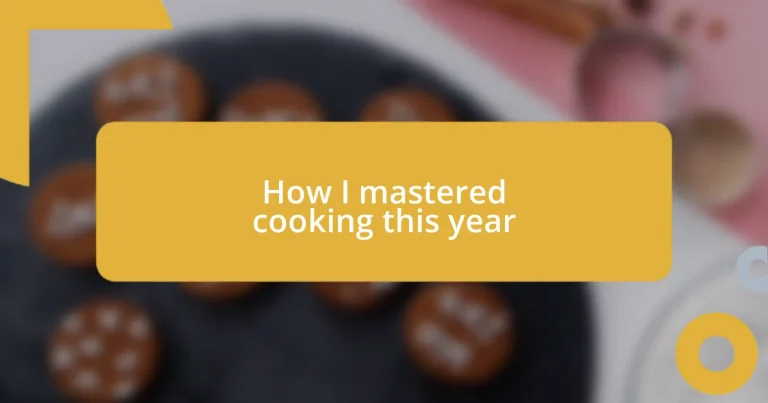Key takeaways:
- Setting clear cooking goals, such as mastering new cuisines, enhanced skills and transformed cooking into a creative outlet.
- Learning essential techniques and using the right tools elevated cooking quality, making it more enjoyable and professional.
- Seeking feedback from others and reflecting on personal achievements fostered growth and confidence in culinary skills.
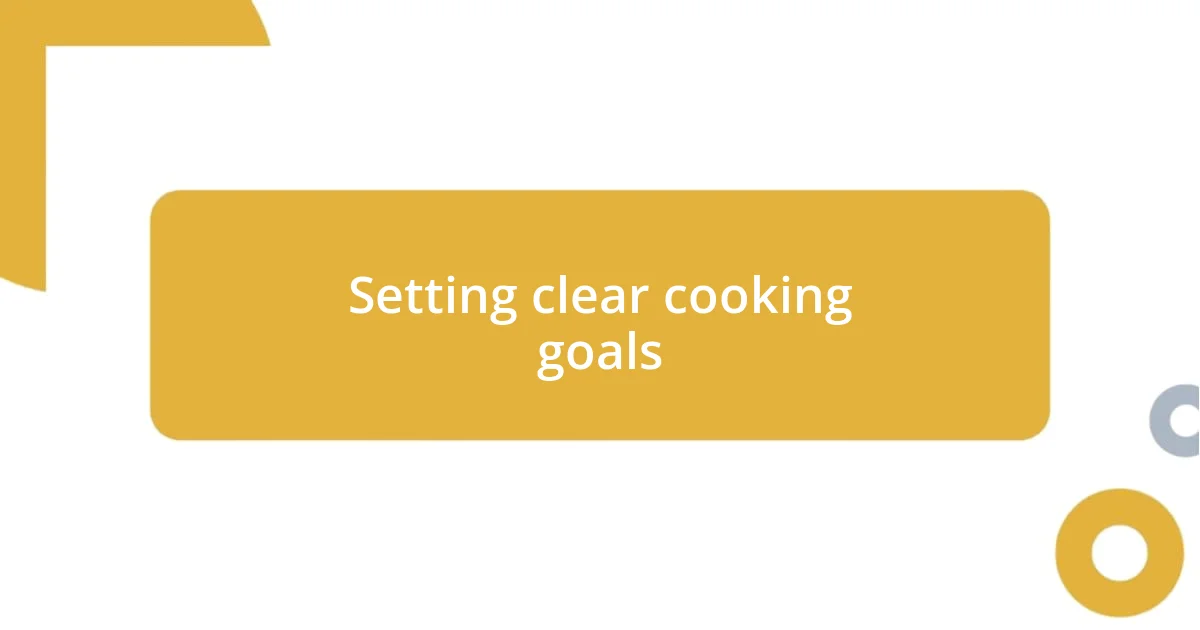
Setting clear cooking goals
Setting clear cooking goals has been a crucial step in my culinary journey this year. I vividly remember the moment I decided that I needed to master at least three new cuisines. It was overwhelming at first, but breaking that goal down into smaller, manageable steps made it both exciting and achievable. Have you ever felt that rush of taking on a big challenge? That’s exactly what a clear goal can give you—a sense of direction and purpose.
As I dived into cooking Indian, Italian, and Mexican dishes, I created specific mini-goals for each cuisine—like mastering the perfect curry or a homemade pasta dish. Tracking my progress felt rewarding, especially when I could ultimately showcase my creations to friends and family. Isn’t it rewarding when others appreciate your hard work? That slice of gratitude makes all the effort worthwhile, and it reinforces your commitment to your cooking journey.
Reflecting on these goals, I realized they’ve not only enhanced my skills but also brought a sense of joy and creativity to my life. Cooking became a form of self-expression for me. When was the last time you tried something new in the kitchen that made you feel proud? Setting distinct cooking goals helped transform my kitchen from a place of obligation into a canvas of endless possibilities.
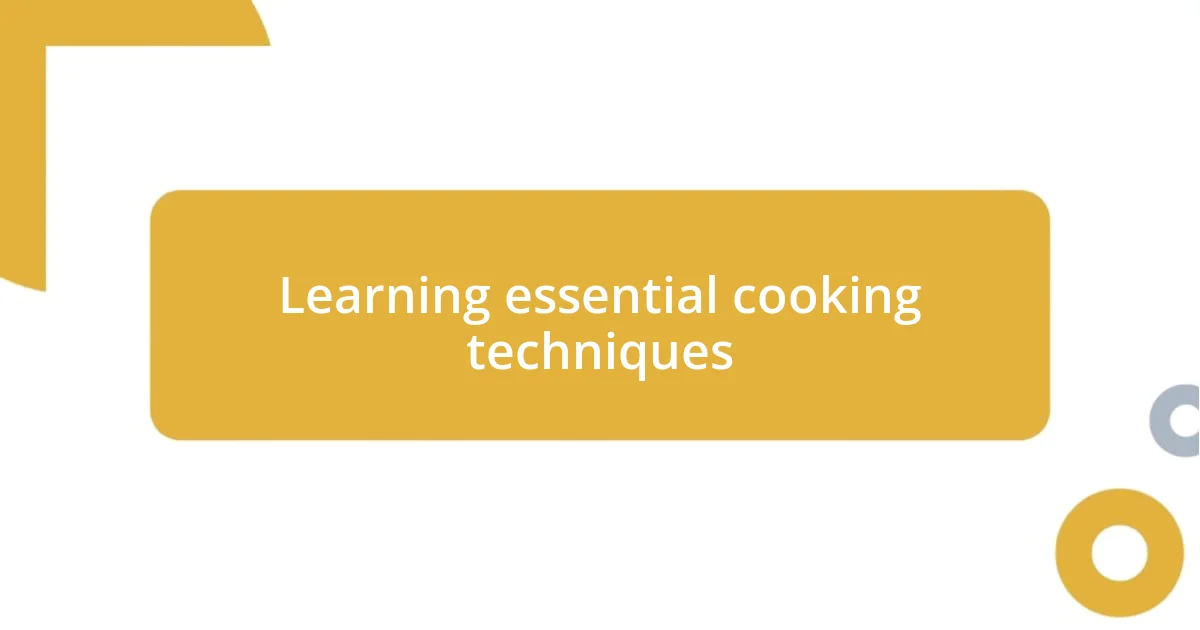
Learning essential cooking techniques
Learning essential cooking techniques has truly been a transformative experience for me this year. I wasn’t just throwing ingredients together; I focused on mastering foundational skills like chopping, sautéing, and braising. The first time I managed to julienne vegetables perfectly, I felt a surge of pride—almost like accomplishing a mini-milestone. Have you ever mastered a technique that suddenly made your cooking feel more professional?
As I ventured further, I explored the art of seasoning. Learning when and how to add salt, acid, or spices completely changed the way my dishes came to life. There was one evening when I had friends over for dinner, and I decided to create a rhythm in my cooking. I realized that each technique I learned layered flavor and texture, making my meal not just a feast for the stomach but also for the senses. Isn’t it amazing how something as simple as seasoning can elevate a dish?
Tracking my growth in cooking techniques became thrilling, almost like a game. I started with a checklist of skills to master—sautéing, roasting, and poaching. With each checkmark, I gained confidence and insight. I distinctly remember the first time I poached eggs successfully. Seeing those perfectly runny yolks reminded me of the joy that comes from small victories in the kitchen. Cooking isn’t just about following recipes; it’s about mastering the techniques that turn good dishes into great ones.
| Cooking Technique | Description |
|---|---|
| Chopping | Learning to cut ingredients uniformly for even cooking and presentation. |
| Sautéing | Cooking food quickly in a small amount of oil over high heat, enhancing flavors. |
| Braising | A slow-cooking technique combining moisture and dry heat to tenderize tougher cuts of meat. |
| Seasoning | Understanding the balance of salt, spices, and acidity to enhance flavors. |
| Poaching | Cooking food gently in simmering liquid, preserving delicate textures. |
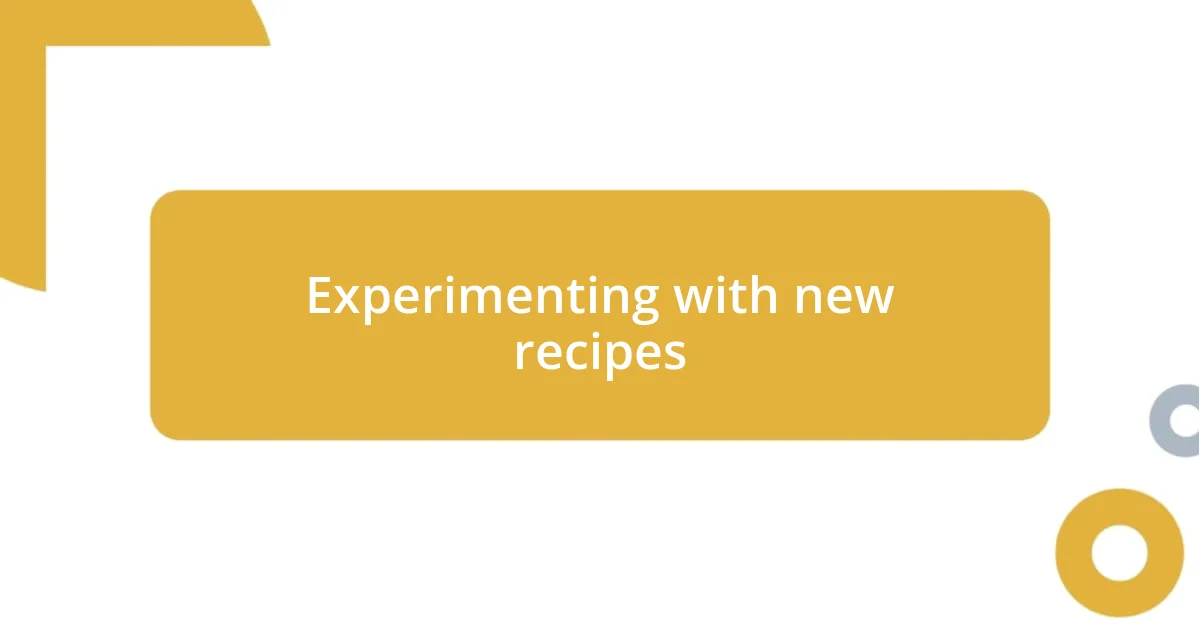
Experimenting with new recipes
Experimenting with new recipes has been a thrilling adventure for me this year. Each time I cracked open a cookbook or scrolled through a recipe blog, I felt that familiar spark of excitement. I remember one particular evening when I decided to tackle a Moroccan tagine for the first time. The medley of spices filled my kitchen with an aroma that was intoxicating. I could hardly wait for dinner to begin! It was through these new experiences that I not only learned new techniques but also developed my palate. The joy of tasting my experiments, especially when they turned out surprisingly well, propelled me to keep trying.
Here are some fantastic ways I approached experimenting with new recipes:
- Theme Nights: I dedicated certain nights solely to exploring new cuisines, turning dinner into a mini cultural experience.
- Ingredient Challenges: I picked one ingredient I had never used before and built a meal around it, which led to delicious discoveries.
- Interactive Cooking: Inviting friends over to cook new recipes together transformed the experience; laughter in the kitchen made everything tastier!
- Recipe Tweaks: I never hesitated to modify recipes based on what I had at home; sometimes the best dishes come from a little creativity.
- Documenting the Journey: Keeping a journal of what worked and what didn’t helped me refine my approach and remember the flavors I loved.
I find that experimentation can sometimes lead to unexpected outcomes, and that’s part of the fun! There was this time I attempted to make a souffle, and let’s just say it did not rise as I had hoped. Instead of disappointment, I laughed it off and dubbed it a “deconstructed souffle.” Sharing the mishap with friends turned a minor kitchen disaster into a cherished memory. Isn’t it fascinating how these cooking stories bring us together? Each failed attempt often becomes a stepping stone to an even better dish down the line.
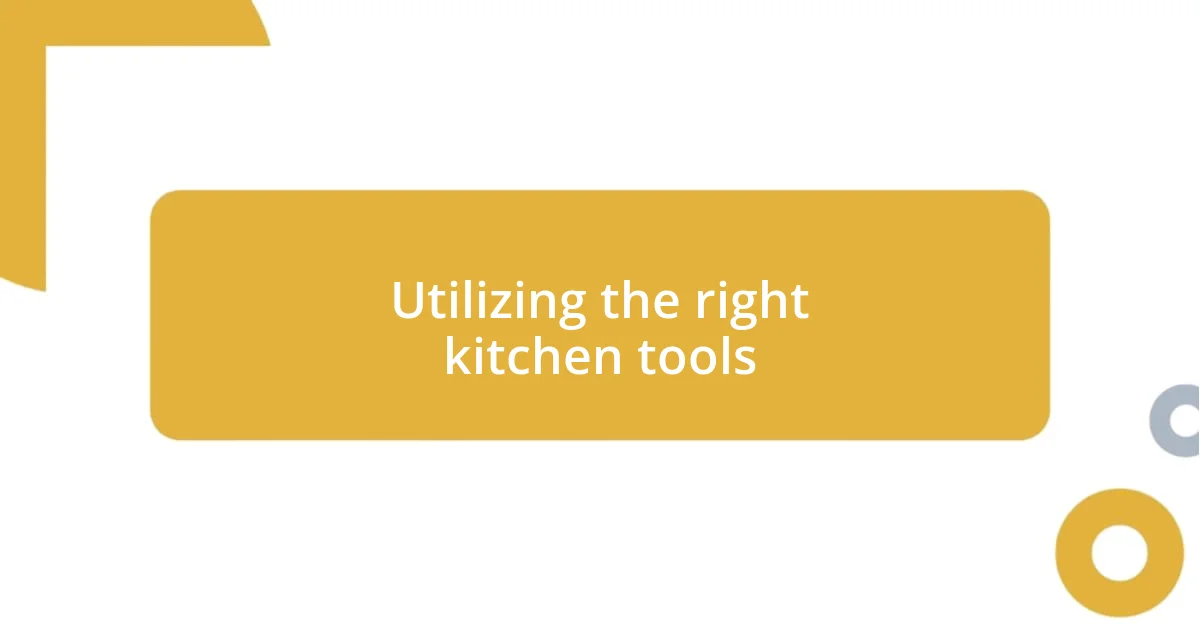
Utilizing the right kitchen tools
Utilizing the right kitchen tools has made a significant difference in my cooking journey. When I first started experimenting in the kitchen, I quickly realized that having the proper equipment is just as important as mastering techniques. For instance, investing in a good chef’s knife not only streamlined my chopping but also enhanced my confidence. Have you ever struggled with dull knives? There’s a surprising joy in slicing through vegetables with ease!
I’ve also found that each tool has its own personality. My trusty cast-iron skillet has become my go-to for everything from searing meat to baking cornbread. The first time I removed a perfectly crispy frittata from it, I couldn’t help but feel like a culinary rockstar. It’s funny how a piece of iron can hold so much power in elevating your dishes, isn’t it? I always keep it seasoned, and that frequent care feels like bonding with an old friend.
On the flip side, I learned that not every tool is essential; it’s about quality over quantity. I used to hoard gadgets that ended up collecting dust, but now, I focus on versatile items. For instance, my immersion blender has been a game changer for soups and sauces. I’ve made creamy butternut squash soup with it, and it was so simple. Have you ever discovered a tool that fits perfectly into your cooking style? Finding that right fit can truly ignite your passion for cooking!
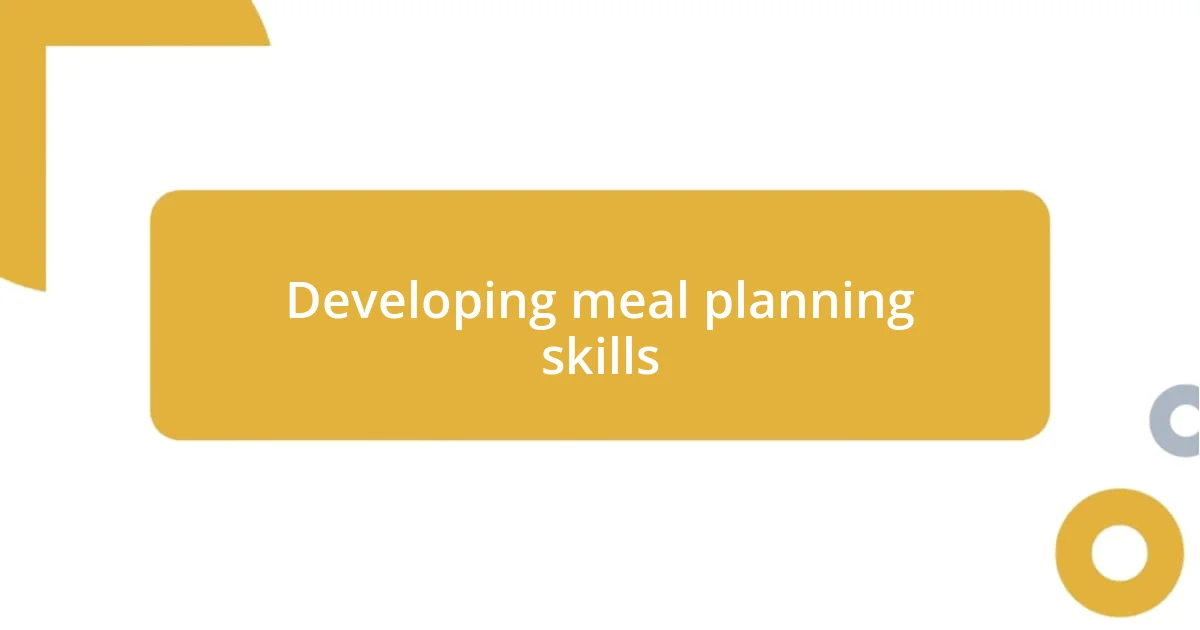
Developing meal planning skills
Developing meal planning skills has transformed my cooking experience this year. I remember my first successful meal prep session; it was a Sunday afternoon and I felt like I was taking control of my week. I laid out all my ingredients, and as I chopped and sautéed, the sense of accomplishment washed over me. Meal planning not only streamlined my weeknight dinners but introduced a sense of predictability in my otherwise chaotic routine. Have you ever felt overwhelmed by deciding what to eat? I know that feeling all too well!
One strategy that’s really worked for me is setting aside time every week to create a menu. I jot down my cravings and themes for each day; taco Tuesday has become a family favorite. What’s remarkable is how this simple act alleviates stress. Instead of staring at an empty fridge, I found myself excited about cooking meals I intentionally planned for the week. The planning process made grocery shopping feel like an adventure rather than a chore. Do you enjoy checking items off a list as much as I do?
I also learned that it’s vital to stay flexible with my meal plans; life can be unpredictable. There were times when I swapped a planned stir-fry for a spontaneous pasta dish with leftover ingredients. Embracing that flexibility has led to delightful surprises in the kitchen. I still remember the night I used leftover vegetables to whip up a frittata. The burst of color on my plate not only looked inviting but also felt like an accomplishment. It’s these unexpected moments that keep my cooking journey vibrant and enjoyable, don’t you think?
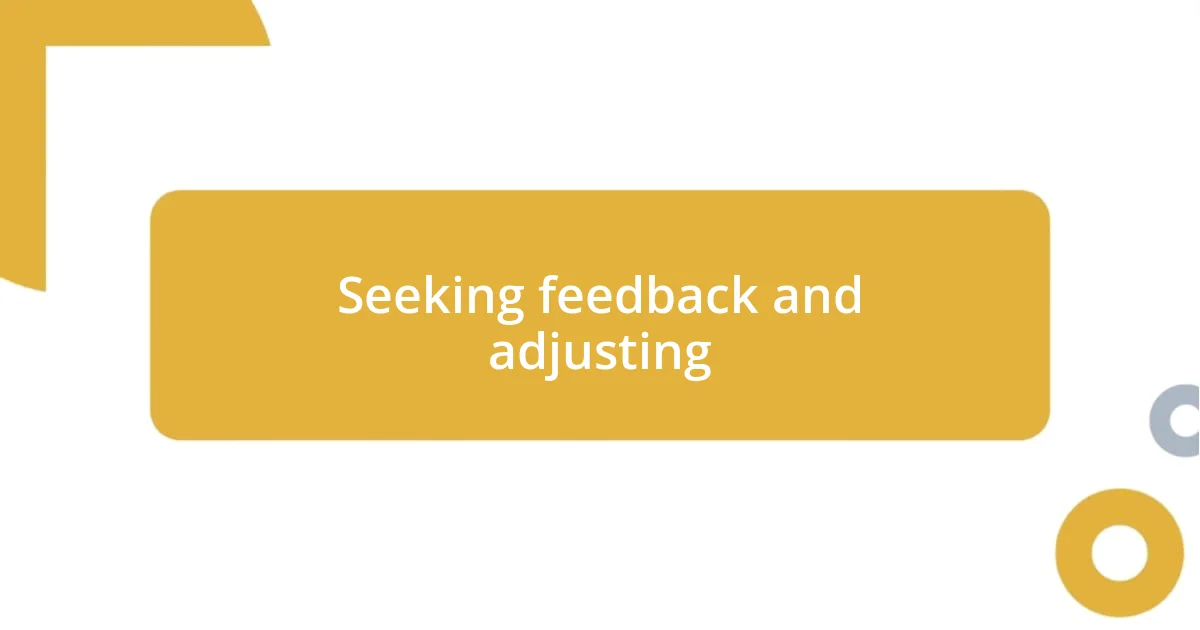
Seeking feedback and adjusting
Seeking feedback has been an eye-opener for me in my cooking journey. Initially, I relied solely on my own taste buds, but asking family and friends for their opinions changed everything. There’s a genuine thrill when someone compliments a dish, but even constructive criticism can be a goldmine for improvement. Have you ever tasted something that left you scratching your head, wondering how to recreate it? That was my experience after a friend raved about my roasted vegetables, and their feedback inspired me to enhance my seasoning game.
Adjusting my recipes based on feedback has turned cooking into an exciting experiment. One evening, I decided to take a chance with a new pasta dish after hearing suggestions on balancing flavors. I swapped a hint of lemon for the traditional cream, which not only lightened the meal but added a zest that surprisingly delighted everyone, including myself! Isn’t it amazing how one little tweak can elevate a dish? That night, I learned the beauty of being open to change, which is crucial in a kitchen full of possibilities.
Moreover, I’ve come to cherish the process of refining my skills through feedback. I often think back to a cooking class where we shared our creations and provided insights. One student pointed out how my presentations could be more appealing. Since then, I’ve actively worked on my plating and have seen how visually stunning dishes can make meals feel more special. Have you ever realized that presentation can completely change the dining experience? By inviting others’ perspectives, I not only improved my cooking but also forged a deeper connection with the food I create.
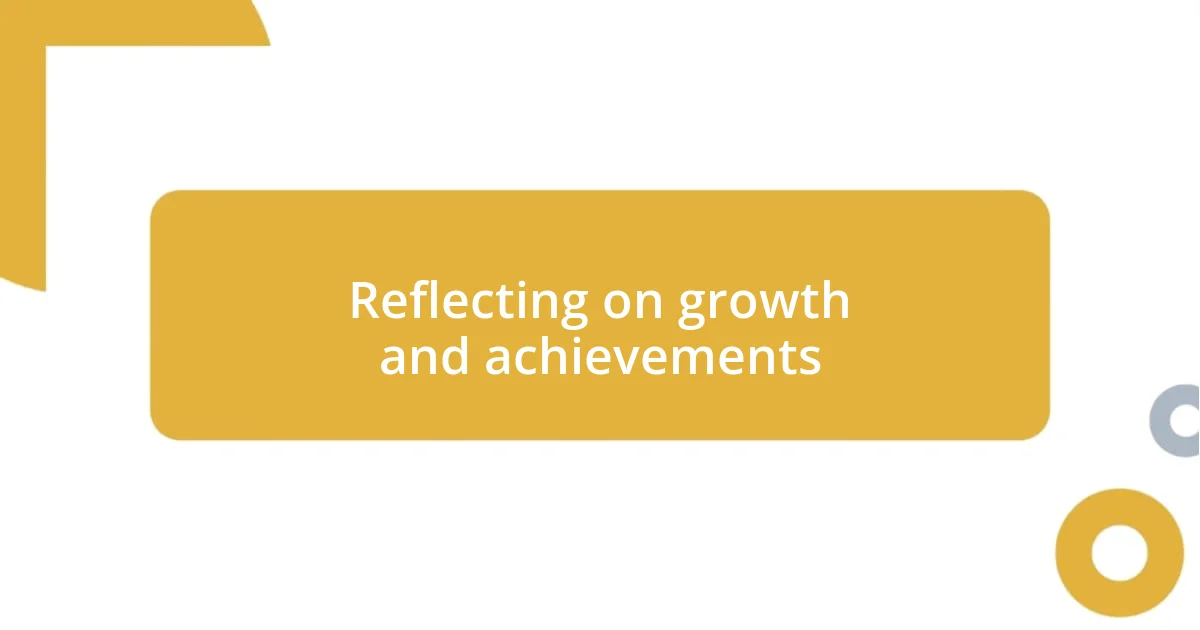
Reflecting on growth and achievements
Reflecting on my growth this year, I can’t help but feel a sense of pride in my culinary journey. There was a moment during a dinner gathering when I served a dish that surprised everyone, including myself. It was a complex curry, and as my guests savored the flavors, I realized that my cooking had transformed from simple meals to expressions of creativity. Have you ever felt that joy of sharing something you created? It’s a reaffirmation of all the effort I poured into learning.
As I look back, I appreciate how far I’ve come with my confidence in the kitchen. I remember last summer, staring at a whole fish, feeling utterly intimidated. Instead of succumbing to fear, I took it on as a challenge. I researched different cooking methods and even watched a few tutorials. The first time I plated that fish beautifully, the accomplishment brought an indescribable rush of exhilaration. Have you ever faced something that seemed daunting, only to triumph in the end? Moments like that make me realize that growth often emerges in the face of challenges.
I’ve also learned to celebrate the little milestones along the way. A few weeks ago, I successfully made homemade bread for the first time, and the aroma filled my kitchen with warmth. Kneading the dough felt almost meditative, and when I pulled that golden loaf out of the oven, I felt like a true baker. It’s experiences like this that highlight how cooking is not just about nourishment; it’s also about the joy and satisfaction of creating something from scratch. Have you found joy in simple tasks? It’s these reflections that continually inspire me to keep exploring and mastering the art of cooking.












